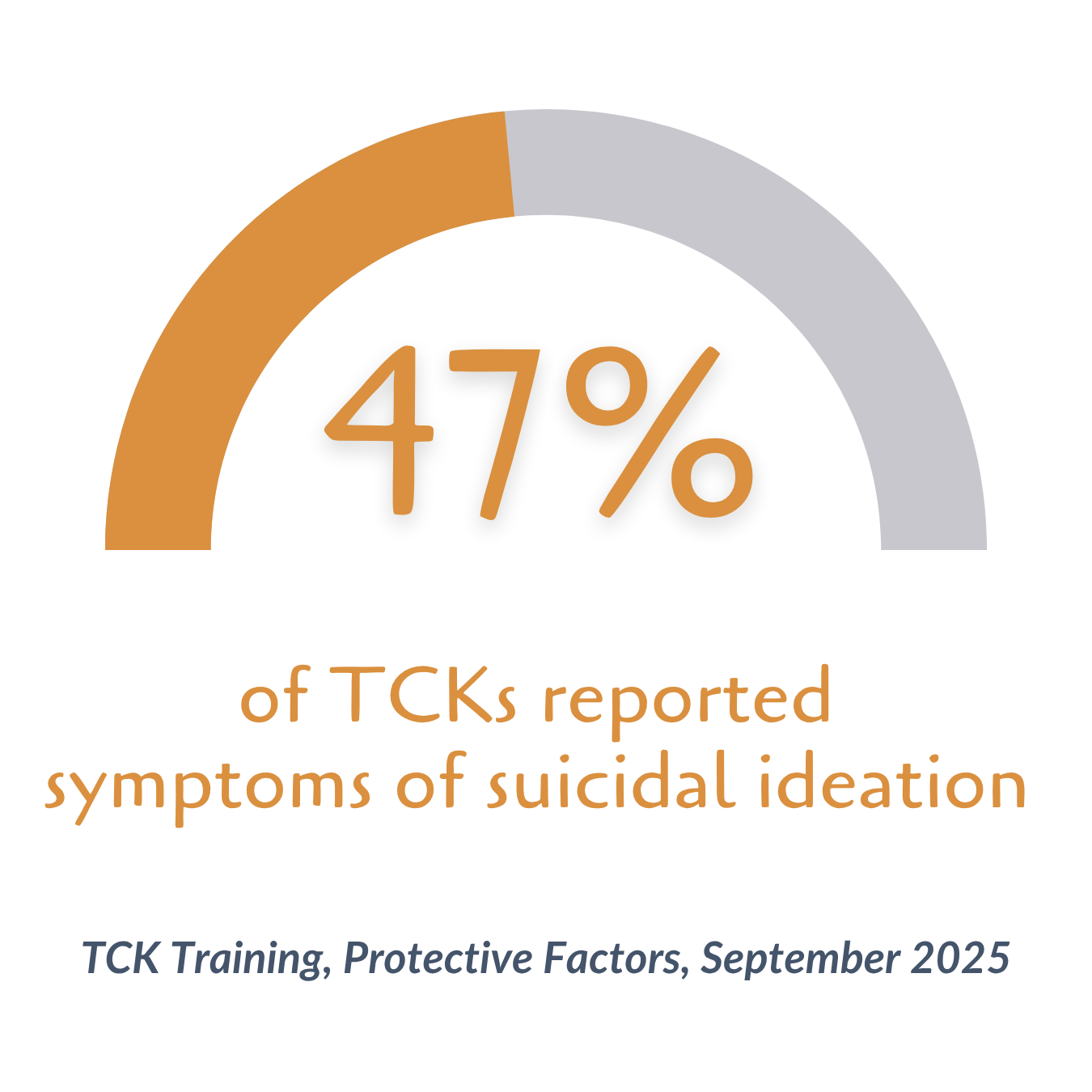A Practical Guide to Supporting Suicidal TCKs
(from someone who’s been there)
1. Have your own healthy support systems
Teach them to utilize support systems through modeling. How they see you handle heavy or hard seasons lets them know what tools, resources, and systems could be good for them too. Modeling isn’t just taking care of yourself but communicating how you’re taking care of yourself so they can learn those skills too.
Also when you’re at your healthiest then you can support them best!
Teach them to utilize support systems through modeling. How they see you handle heavy or hard seasons lets them know what tools, resources, and systems could be good for them too. Modeling isn’t just taking care of yourself but communicating how you’re taking care of yourself so they can learn those skills too.
Also when you’re at your healthiest then you can support them best!
2. Receive ALL of their struggles well (even the “small” ones)
How you respond to their “small” struggles teaches them whether they can trust you with the big ones. Many kids subconsciously share mundane struggles with you first to see how you’ll react before diving into the “big” things.
Our 20-minute FREE safe space responses course will prepare you to start on the right foot.
Our 20-minute FREE safe space responses course will prepare you to start on the right foot.
3. Be aware of how you talk about mental health challenges publicly
Kids notice how you speak. They are watching all the time, they pick up on the things you might not even notice. What you say about mental health will let them know if you’re a safe person or not. If they’re currently struggling it may also cause them to feel ashamed and isolated if they think you would judge them.
Kids notice how you speak. They are watching all the time, they pick up on the things you might not even notice. What you say about mental health will let them know if you’re a safe person or not. If they’re currently struggling it may also cause them to feel ashamed and isolated if they think you would judge them.
4. Explicitly say these three phrases to them personally
“There’s nothing you could say or do that would make me love you any less.”
“There’s nothing you could say or do that would make me love you any less.”
“There’s nothing you could tell me that would be too big for me to hear.”
“You’re not a burden. It’s a joy and an honour to know your story and walk through it with you.”
Don’t say these phrases just once and assume they really believe you. Repeat them like a broken record. They need to know you’re both able and willing to carry their pain with them if it arises.
When someone is struggling with suicidal ideation, they often wonder and fear how the people around them will react if they find out. Anyone - TCK or not - might worry that this is “too much” for their parents or a caregiver to handle.
So please make sure if you say these things, you are ready to receive whatever they may tell you, whether it’s right then or even a few months or years down the road.
What is most heartbreaking to me over the years has not just been that TCKs haven’t felt emotionally safe enough to share this with people who would have supported them, but when they have shared because someone expressed that they were safe… only to find out that person was not. Please make sure you’re ready!
(The resources recommended below will prepare you to be ready! Please check out each of them!)
5. Be prepared to share resources with them
Quality resources make a huge impact. First and foremost a TCK struggling with suicidal ideation needs a licensed therapist. Over the years we’ve pulled together a list of TCK-informed therapists, databases, and counseling centers to be shared.
I consistently pray for more counseling resources to be accessible. We designed our Counseling TCKs: Therapist Training that any counselor, whether they’ve worked with TCKs before or not, would be equipped to understand the TCK population, avoid misdiagnosis, and truly help TCKs find hope considering the nuances of their global experience.
Quality resources make a huge impact. First and foremost a TCK struggling with suicidal ideation needs a licensed therapist. Over the years we’ve pulled together a list of TCK-informed therapists, databases, and counseling centers to be shared.
I consistently pray for more counseling resources to be accessible. We designed our Counseling TCKs: Therapist Training that any counselor, whether they’ve worked with TCKs before or not, would be equipped to understand the TCK population, avoid misdiagnosis, and truly help TCKs find hope considering the nuances of their global experience.
They may need additional resources. I’ve included a list of a few more at the bottom of this article you might want to suggest or even watch yourself in order to support them well.
5. Get trained in suicidal intervention
Suicide Intervention Training provides lifesaving skills. Even when there were protective factors in place and low levels of trauma, still 35% of TCKs reported symptoms of suicidal ideation (from our 2024 research, Protective Factors that Improve Long Term Wellness in TCKs: Research into ACEs, PCEs, and Childhood Mobility.).
Suicide Intervention Training provides lifesaving skills. Even when there were protective factors in place and low levels of trauma, still 35% of TCKs reported symptoms of suicidal ideation (from our 2024 research, Protective Factors that Improve Long Term Wellness in TCKs: Research into ACEs, PCEs, and Childhood Mobility.).
I wanted to highlight this statistic not because I want to scare you. But because I want to implore you:
If you interact with TCKs in any capacity, it is necessary for you to know how to provide suicide intervention.
If you interact with TCKs in any capacity, it is necessary for you to know how to provide suicide intervention.
You may never have to use it, but there is hope and comfort that comes in being properly equipped to navigate those conversations.
We have two different ways you can get access to our Suicide Intervention for TCKs training:
- You can take the individual 6-hour TCK Suicide Intervention Training,
- Or get the 8-unit Groundwork Certification (that includes the Suicide Intervention Training along with 7 other essential units for TCK caregivers)





